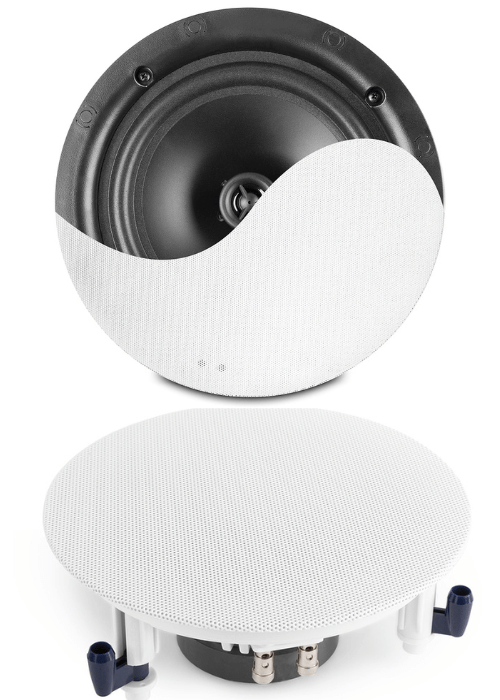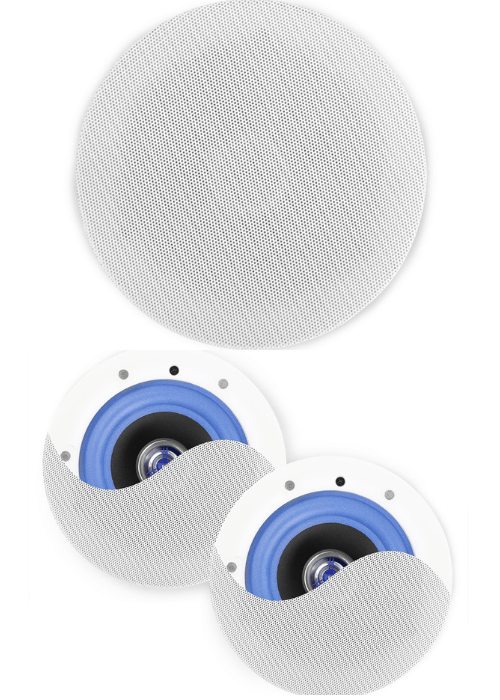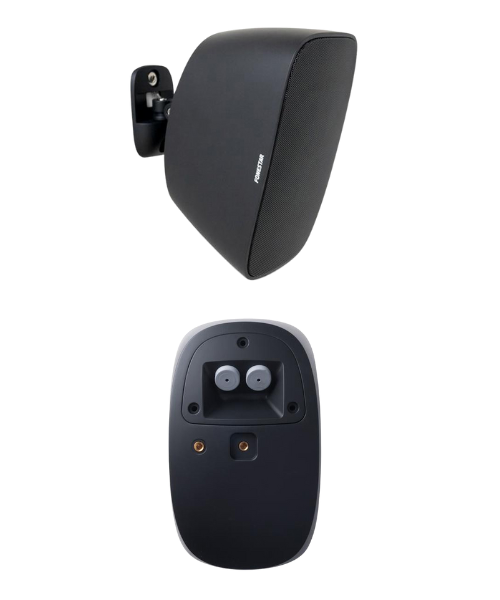Imagine setting up an outdoor sound system, only to have the speakers fail after the first heavy rainfall. Or installing warehouse speakers that struggle with dust buildup, leading to poor performance over time. This is exactly why IP ratings exist.
These ratings indicate how well a speaker can resist dust, dirt, and moisture, crucial factors when choosing outdoor speakers, waterproof speakers, or marine speakers. While indoor speakers don’t have to deal with harsh conditions, those used outside, in warehouses, or on boats, need protection to ensure longevity.
But what do these ratings actually mean? How waterproof is "waterproof"? And do you really need the highest rating available? This blog will break down the essentials of IP ratings, clear up common misconceptions about waterproofing, and help you choose the right level of protection for your setup. Let’s start by looking at what an IP rating actually is and why it matters when selecting a speaker.


What is an IP Rating?
IP (Ingress Protection) ratings are an international standard that indicate how well a device, including speakers, is protected against solid objects like dust and liquids like water. The rating consists of two numbers, each representing a different level of protection. The first digit (ranging from 0 to 6) refers to resistance against solid particles, such as dust and dirt. The second digit (ranging from 0 to 9K) measures how well the device withstands moisture, from light splashes to full submersion. Simply put, the higher the numbers, the better the protection.
For example, an IP65-rated speaker is fully dustproof and can handle direct water jets, making it a solid choice for outdoor speakers exposed to unpredictable weather. Meanwhile, an IP67-rated speaker offers complete dust protection and can be submerged in water for short periods, making it ideal for marine speakers used on boats or in coastal areas. Understanding these numbers helps you choose a speaker that will last in its intended environment, whether it's an outdoor patio, a warehouse, or a boat deck.
Why Does a Speaker’s IP Rating Matter?
Not all speakers are designed for the same environments, and without the right IP rating, your setup could be at risk. A standard indoor speaker may deliver great sound in a controlled environment, but introduce it to an outdoor space, and it won’t last long against rain, dust, or temperature fluctuations. In contrast, outdoor speakers with a suitable IP rating are built to handle these elements, ensuring they continue to function reliably. Even in industrial settings, warehouse speakers need protection from dust accumulation, which can clog components and cause long-term damage.
For speakers used in wet or high-moisture areas, the right level of waterproofing is essential. Marine speakers, for example, must endure constant exposure to humidity and saltwater, which can be highly corrosive. Without an adequate IP rating, the internal components could degrade quickly, leading to malfunctions or total failure. By selecting the correct rating for your environment, you ensure your speakers remain durable and perform as expected, whether they’re installed in a garden, a warehouse, or on a boat. To put it plainly, choosing the right IP rating can save you a lot of money in the long term, helping avoid replacing faulty equipment.
Choosing the Right IP Rating for Different Environments
Not all environments pose the same risks to speakers, and understanding where and how a speaker will be used is just as important as knowing its IP rating. A speaker installed in a garden faces different challenges than one mounted in a warehouse, and a speaker used on a boat must withstand far more extreme conditions than one placed on a patio. By selecting the right level of protection, you ensure long-term reliability without unnecessary overengineering.
For general outdoor use, a speaker with IP55 or IP65 protection is often sufficient. These ratings provide strong resistance to dust and moisture, making them well-suited for garden installations, restaurant terraces, and commercial outdoor spaces. If the speaker will be directly exposed to heavy rain, higher ratings such as IP66 or IP67 offer better protection. Marine speakers, designed for use on boats or in coastal environments, require a higher level of sealing to prevent water ingress, typically rated IP67 or IP68 to withstand prolonged exposure to humidity, saltwater, and direct splashes.
Warehouses present a different challenge. While they may not expose speakers to water, they often have high levels of airborne dust, which can interfere with internal components over time. A warehouse speaker with an IP5X or higher rating ensures that dust won’t accumulate inside, maintaining reliability in dusty environments. In industrial settings where water may be used for cleaning, a speaker with IP65 or IP66 protection ensures it can handle occasional exposure without damage. However, there is no need to worry, as many commercial audio systems are designed to be protected against this but it is always best to check just in case in the products description.
Choosing the correct IP rating isn’t about getting the highest number possible, it’s about finding the right balance of protection for the conditions the speaker will face. This not only ensures durability but also prevents unnecessary costs associated with over-specification.
Is Waterproof Really Waterproof? Understanding the Limits of IP Ratings
When a speaker is labeled as waterproof, it’s easy to assume it can handle anything, heavy rain, accidental spills, or even an unexpected dive into the pool. But while IP ratings tell you how well a speaker resists moisture, they don’t tell the whole story. Just because a speaker has a high rating doesn’t mean it’s invincible.
The key thing to understand is that IP testing is done in controlled conditions. For example, an IP67-rated speaker can be submerged in water up to one metre for a limited time, but that doesn’t mean it’s designed to handle the unpredictable chaos of real-world use. Splashing pool water mixed with chlorine, salt spray from the ocean, or even prolonged humidity can have a different effect than a simple lab test in fresh water. Marine speakers often have extra coatings and corrosion-resistant materials to protect against salt exposure, something an IP rating alone won’t indicate. This means it is best to check the product description to make sure before purchasing a speaker. However, there is one exception to this of course, being the IPX8 which is made to the highest resistance standards and can withstand these harsh conditions.
Another common misconception is that a higher rating always means better protection in all conditions. IP68 speakers, for instance, may be designed for prolonged water exposure, but this doesn’t necessarily mean they can handle high-pressure jets or sudden temperature changes. Essentially, although they are made to withstand harsh conditions, they are not bullet proof by any means. Some waterproof speakers may be resistant to submersion but not built to handle heavy rain for extended periods, making placement just as important as the rating itself.,
While an IP rating is a great guide, it’s not a free pass to expose your speakers to extreme conditions without care. Even waterproof speakers have their limits, and understanding those limits can mean the difference between long-term durability and an expensive replacement.
Do IP Ratings Affect Sound Quality?
When shopping for outdoor speakers, waterproof speakers, or marine speakers, the focus is often on durability. But what about sound quality? A common concern is whether the protective sealing required for a high IP rating has an impact on audio performance.
Speakers with high IP ratings are designed with enclosures that prevent dust and water from getting inside. This means they often lack open ports or vents, which standard indoor speakers use to produce richer bass. However, manufacturers compensate for this by using moisture-resistant polypropylene cones, durable butyl rubber surrounds, and rust-resistant grilles made from aluminum or powder-coated steel. Many outdoor speakers also feature high-efficiency drivers and wider dispersion angles, ensuring clear and powerful sound even in open environments.
Another factor to consider is speaker placement. Outdoor speakers are typically mounted on walls, under eaves, or embedded in garden spaces, which can affect how sound travels. Having wall mounted speakers up high or at a head height directed properly can add to a speakers sound quality and coverage massively. Unlike indoor setups, where walls and ceilings help reflect and amplify sound, outdoor environments require speakers with stronger projection. This is why marine speakers, waterproof speakers, and bathroom speakers often have a slightly different frequency response, focusing on clarity and volume rather than deep, resonant bass.
Ultimately, a well-designed IP-rated speaker balances protection with performance. While extreme waterproofing may slightly alter acoustics, advancements in speaker technology mean that modern outdoor speakers and marine speakers can still deliver crisp, full-bodied sound without compromising on durability.


Keeping Your Outdoor and Waterproof Speakers in Top Condition
Buying outdoor speakers or waterproof speakers with the right IP rating is a great start, but proper maintenance is what keeps them performing at their best. While these speakers are built to withstand tough conditions, a little care goes a long way in ensuring they last for years without issues.
One of the easiest ways to extend a speaker’s lifespan is through regular cleaning. Marine speakers and outdoor speakers often collect dust, dirt, and even salt residue if used in coastal areas. Wiping them down with a damp cloth and ensuring that grilles and ports remain free of debris helps maintain sound clarity and prevents long-term damage. If your speakers are mounted in a particularly dusty environment, such as a warehouse, occasional compressed air cleaning can help keep dust from settling into any exposed components.
Placement also plays a crucial role in longevity. Even if a speaker is rated IP65 or higher, mounting it in a slightly sheltered spot can reduce its exposure to extreme weather conditions. For marine speakers, rinsing them with fresh water after use in salt-heavy environments helps prevent corrosion, ensuring that protective coatings remain intact. Waterproof doesn’t mean maintenance-free, taking a few simple precautions will keep your system working flawlessly.
Even the most durable waterproof speakers will benefit from occasional checks. Making sure connections are secure, seals remain intact, and no cracks or wear have developed over time will prevent minor issues from turning into major problems. Investing in the right IP rating is important, but giving your speakers the care they need ensures you get the most out of them for years to come.
Do You Always Need the Highest IP Rating?
It’s easy to assume that the highest IP rating is always the best choice, but in reality, more protection doesn’t always mean a better speaker for your needs. While IP67 or IP68-rated speakers offer the best protection against water and dust, that level of sealing isn’t necessary for every setup. Choosing a speaker with an unnecessarily high rating could mean paying for features you don’t actually need.
For example, if you’re installing outdoor speakers under a patio or in a semi-covered space, an IP55 or IP65-rated model is usually more than enough to handle rain, wind, and dust without any issues. On the other hand, if your speakers will be completely exposed to the elements with no overhead protection, or if they’re in a high-humidity environment, a higher IP rating like IP66 or IP67 would be the safer choice. Marine speakers need extra protection due to constant exposure to moisture and salt, but if you’re simply setting up a garden speaker system, there’s no need to over-engineer your setup with fully submersible models.
The key is to match the IP rating to the environment. Overprotecting your speakers won’t harm them, but it can add unnecessary costs. Under protecting them, however, could lead to early failure and the need for replacements. Understanding what level of protection is truly necessary ensures you’re making the best choice, both for performance and longevity.
Final Thoughts
Understanding IP ratings is the key to choosing the right outdoor speakers, waterproof speakers, or marine speakers for your setup. Whether you're looking for a system to handle unpredictable weather, resist dust in an industrial setting, or survive splashes on a boat, the right level of protection ensures long-term reliability. But as we’ve seen, a higher IP rating isn’t always necessary, what matters most is selecting a speaker that matches the environment it will be used in.
A well-chosen IP-rated speaker will provide years of durability without compromising on performance. While these ratings are a great guide, placement, maintenance, and common sense all play a role in keeping your speakers in top condition. If you're unsure which IP rating is right for you, taking the time to assess your environment and speaker placement will help you make the best decision. By choosing wisely, you’ll not only avoid unnecessary costs but also ensure your speakers deliver reliable sound, no matter where they’re installed.









